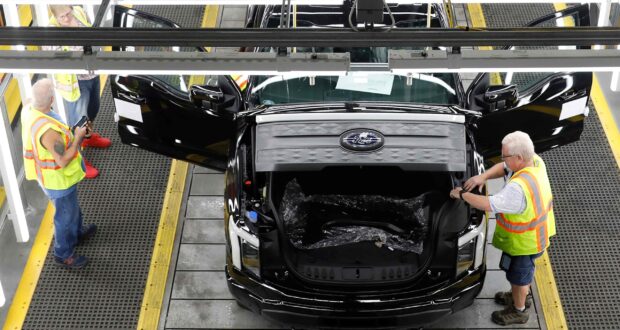The Climate Council has said all petrol and diesel car sales should be banned by 2035 if Australia wants to have a 'zero-emissions fleet' by 2050, but the leading independent skills training body raised alarm bells about EV workforce demands.
The plan to lower climate pollution by 75 per cent this decade recommends a move away from petrol and diesel vehicles, and also more investment in shared transport, such as better walking and cycling facilities, electrified public transport and rideshare.
The council said by 2029, one-third of all taxi, rideshare and government fleet vehicles should be EVs, one-third of current road freight should be moved to rail, and 17 per cent of all trucks on our roads should be electric.
Transport is Australia's fastest-growing source of climate pollution, making up 22 per cent of the national total, currently sitting at 102 metric tons of carbon dioxide equivalent (MTCO2e).
Under current policies, the council said, 2030 emissions would drop to 94.6 MTCO2e; but their policies would halve it to 45.3 MTCO2e.
The federal government's National Electric Vehicle Strategy aims to push the supply and demand of EVs, and recent legislation, following the Strategy, will require car manufactures to slowly lower vehicle's carbon emissions over time.
In a submission to a current inquiry into EVs, the Independent Tertiary Education Council Australia (ITECA) said the Standard 'lacks a detailed plan for workforce development,' as the transition to EVs will have a significant effect on the structure and workforce needs of the automotive industry.
ITECA recommended a comprehensive strategy addressing the changing skills and job requirements, which includes new positions like repair technicians, battery specialists and software engineers for vehicle management systems.
'There is an urgent need to develop robust training programs ... [that] facilitate upskilling and reskilling of the current workforce to manage electric drivetrains, battery systems, and charging infrastructure,' the submission says.
The government should utilise the capabilities of both independent registered training organisations (RTOs) and public TAFEs to reskill the 157,000 strong petrol and diesel workforce, ITECA says, particularly in regional and remote areas.
'This approach is paramount in ensuring that workers skilled in traditional internal combustion engine vehicles can transition to the EV sector seamlessly, maintaining employability as the industry evolves,' the submission says.
'[RTOs] serve as the education backbone for 87.3 per cent of students in the Automotive Industry Retail, Service and Repair training package, which is instrumental to developing the skills required for EV maintenance and repair.'
ITECA propose the government work closely with industry to rapidly develop efficient and targeted EV training programs.
Do you have an idea for a story?Email [email protected]
 Campus Review The latest in higher education news
Campus Review The latest in higher education news

